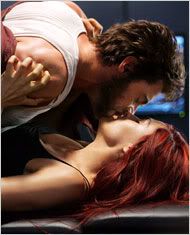Article of interest as the summer flicks roll out
Who cares what the reviews say?
The film of The Da Vinci Code was savaged by reviewers, but that hasn't stopped audiences flocking to see it. It's the latest example of a 'critic-proof product', writes Mark Lawson
Four years ago, I faced an ethical dilemma. My duties as a crime and thriller reviewer for the GuardianEDITOR'S NOTE: ENGLAND. FYI.... had brought in a book by a little-known American writer. It was a matter of fine judgment whether the content (conspiracy theory) or the prose (making a crisp packet read like a sonnet in comparison) was more preposterous. I worried, though, about being too brutal to a new talent.
Unfortunately, even the traditional perjury for book reviewers trying to reduce the wound - this will make a great film - could not be applied to a work that seemed about as cameraunready as was possible. In the end, my review condemned the novel as tosh,EDITOR'S NOTE: TO CALL SOMETHING 'TOSH' DOESN'T SEEM NEARLY AS MEAN AS CALLING IT 'CRAP', HUH? balancing the barbs with some thoughts about why post-9/11 American readers might be drawn to fantasies in which events were shown to be meant. Even so, was the piece perhaps too nasty? A newspaper big-foot stamping on an emerging literary career?
You will by now easily have broken the code of which book this was and quite how well the writer survived the savage judgment. And, by proving just as immune to hostile reviews on the screen as on the page, Dan Brown's The Da Vinci Code raises the question of whether printed and broadcast opinion matters at all. Has our culture now created a sort of genetically modified turkey - the critic-proof product?
In fact, although the early box-office performance of The Da Vinci Code suggests the most vivid sighting of such a creature, other recent successes had already indicated that cinema was evolving in this way. Mission: Impossible III has performed impressively, despite critical derision for the movie and significant personal abuse towards its star, Tom Cruise. Before that, Mel Gibson's The Passion of The Christ, which received notably cold notices in most places, achieved almost supernatural takings. EDITOR'S NOTE: SORT OF APPLES-AND-ORANGES THERE. "DA VINCI" AND "MI3" ARE BOTH DOING PRETTY WELL AT THE BOX OFFICE, BECAUSE, DESPITE THE HUBBUB FROM THE CRITICS, THEY ARE ACTUALLY PRETTY GOOD MOVIES. THAT OTHER ONE COULD HAVE BEEN BIBLE PAGES PASTED ONTO FILM STOCK. THE PEOPLE THAT DROVE THE (INCREDIBLE) BOX OFFICE FOR "THE PASSION OF THE CHRIST" WEREN'T GOING PRIMARILY AS FILM AFFICIANADOS.
In each of these cases, reviewers are able to defend their virtue. M:I3, although it will certainly buy the Cruise baby a few diapers, shows a dip in income compared to the first two films in the series, which might be attributed to newspapers making people stay at home.
Similarly, movie reviewers insist that audiences for The Da Vinci Code will fall once the turgidity of the film is circulated by word of mouth. And, the defence of critics runs, the people who went to see The Passion of the Christ were "just American Christians", who are not the preferred readership of the papers that were rude about the movie.
These exculpations are not completely convincing, however.
If you happen to own a company which trucks DVDs to the shops, you would be ill-advised to sell it before M:I3 and The Da Vinci Code come out. Only the most selfbelieving critic could deny the evidence from these events that - in cinema, as in most areas of culture - there is a significant gap between public and pundit opinion.
Movies that appear in hundreds of reviewers' top 10s - such as Michael Hanneke's Hidden and Noah Baumbach's The Squid and the Whale - are unlikely ever to appear in box-office charts. This is because critics are giving marks for originality, acting, photography and scripting, while mass audiences are more drawn to familiarity of genre, stars they would like to have sex with or plots that are more likely to make their dates have sex with them. Reviewers are doing their day's work, cinema-goers are escaping from theirs: this leads to an inevitable difference of response. EDITOR'S NOTE: OVER-SIMPLIFIED A BIT, I THINK. YES, WE ARE ALL UNTHINKING DRONES, BLAH BLAH BLAH. BUT SOMETIMES, THE CRITICS JUMP ON A MOVIE OUT OF A HIPPER-THAN-THOU MALARKY BANDWAGON. SOME OF THESE CRITIC-FASHIONABLE FAVES ARE ALMOST THE OPPOSITE OF BEING CRITIC-PROOF....THEY AER ENTERTAINMENT-PROOF.
It is, though, wrong to conclude that reviewers are completely useless. If The Da Vinci Code had been an unknown novel, media indifference could have killed the film. The same would have been true if Gibson had made a Latin-language movie about Catullus rather than Christ, or Cruise were a novice actor appearing in a movie called Shanghai Tower rather than Mission: Impossible III. The reason all of these movies could bypass the thoughts of the arts pages is that at least one name - Da Vinci, Christ, Cruise, Mission: Impossible - brought in a pre-sold audience. EDITOR'S NOTE: OR MAYBE, IN THE SPECIFIC CASES OF "DA VINCI" AND "MI3" AT ANY RATE, THE CRITICS WENT IN WITH EXPECTATIONS AT A DIFFERENT PLACE THAN THE REALITY OF SUMMER MOVIES. BECAUSE, AGAIN, NEITHER OF THOSE TWO MOVIES IS BAD. THEY ARE ACTUALLY ENJOYABLE. AND THIS IS SUMMER. THERE AREN'T GOING TO BE MANY DEEP AND MEANINGFUL FILMS TILL SEPTEMBER, RIGHT?
The reception of The Da Vinci Code is also interesting in showing not merely the gap between media and ticket-buying opinion (a long-established phenomenon) but also a gulf between official and unofficial reviewers. If blockbuster box-office takings were not already enough to make established film journalists feel at least occasionally irrelevant, their professional significance has been challenged in recent years by websites and blogs on which films are rated by guerrilla critics or cinema-goers who have seen early screenings. This has brought to cinema a version of what happens in music, where, for decades, sales have been driven less by reviewers than by popular response to plays on radio or now online. EDITOR'S NOTE: GOD FORBID WE THINK FOR OURSELVES HOW TO SPEND OUR SHECKLES.
The film director Sam Mendes (American Beauty, Jarhead) has confessed that he regularly checks one internet site - Rotten Tomatoes - on which multiple opinions are averaged out of 10.
By yesterday, The Da Vinci Code was scoring a more than decent 6.7, although it should be noted that nothing would prevent a mass-vote by people with an interest in the film.
In the world of television and books, there would be no surprise at all that professional assessors should be out of step with civilian purchasers. For example, the Top 50 Bestseller list in Britain, based on bookshop sales, currently contains not a single work of fiction that has received significantly good reviews. Admittedly, the selection is slightly skewed by the presence all four novels by Dan Brown - the extreme example of the difference between praise and sales - but the charts also feature numerous other popular novelists, such as Martina Cole and James Patterson, from whom it is scarcely worth the publishers sending out review copies since the books sell millions without any help from the pundits.
In the area of fiction - on factual subjects, there is a greater crossover of taste between punters and pundits - the books pages and the bookshops are separate states, with almost no travel between them. Which is perhaps the place to say that my review of The Da Vinci Code as a book was not "wrong", at least in my opinion; it simply applied values - of literacy, plausibility and characterisation - that are clearly not significant in the choices of beach and plane readers.
For this reason, adulatory reviews for a novel almost never translate directly in to sales; publicity and prizes have a much more substantial impact on a book's success. The influence of awards juries - a Whitbread or Man Booker winner is guaranteed a reprint - is rather peculiar, as many of the judges are critics, applying precisely the criteria by which the literary columns operate. Yet, for some reason, the book-buying public seems to regard the concensus of a panel as more objectively reliable than a single identified critic.
In television, the influence of reviewers has generally been negligible, although the issue is complicated by the tradition in this discipline of employing two different critics to write before and after transmission. As a broad rule, previews were short and useful, reviews longer and amusingly digressive, although the styles have often overlapped, especially in magazines.
The use of television as the basis for a comic essay - exemplified by the Guardian's Nancy Banks-Smith and Clive James in the Observer during the 1970s - was a response to the perceived uselessness of TV reviewing. Because any single-edition show was over by the time the piece was read, these columns had none of the tip-off responsibilities given to film and theatre critics.
This encouraged a habitual division - even greater than the one in books - between what was written about and what was liked. Television's most popular programmes - soap operas such as Coronation Street and EastEnders - were routinely ignored by reviewers, until the pioneering work of Hilary Kingsley and Jaci Stephen.
As it happens, the opening episode of EastEnders, in 1985, was widely reviewed; the BBC was in crisis at the time and the soap was the proposed solution to its problems. The first sight of Albert Square was generally disliked by critics, yet it has survived for more than 20 years.
There are many subsequent examples of the remote-control vote proving decisive, regardless of what the critics think, including ITV1's Footballers' Wives and Channel 4's Big Brother.
The reason that TV is so easily able to appeal over the heads of reviewers is partly that it has a captive audience and partly because it can advertise incessantly to that captive audience through trailers.
Where television critics do have influence is in providing small-audience shows with a cachet that may lead to them being retained or recommissioned. The usual rule is that, in order to survive, a show needs the support of either the audience, an executive or reviewers. The latter are unlikely to be decisive alone but can trigger a death-row appeal.
Theatre is the art form that has always attributed most power to critics. Manhattan folklore was that the New York Times could close a show or keep it going. In Britain, no individual has ever had such impact - John Osborne's Look Back in Anger was popularised by a televised extract, not Kenneth Tynan's Observer rave - but a swarm-review, in which all the critics attack together, has seen off many shows, especially musicals. EDITOR'S NOTE: AND YET, "BLOOD BROTHERS" HAD A NICE, LONG RUN. (GIGGLE...JUST FOR YOU, JOEL)
Even here, though, there is increasing evidence that the Dan Brown curse is extending beyond cinema to the notebook-holding folk at the end of the row. We Will Rock You, the Ben Elton musical based around the songs of Queen, is still running five years after it was rudely rebuked by reviewers. EDITOR'S NOTE: I THINK HE IS MAKING THE ASSUMPTION THAT THE AUDIENCE....READING AUDIENCE, FILM AUDIENCE, TV AUDIENCE, WHATEVER....IS SOME SORT OF MONOLITH. WE ARE A MULTI-HEADED CREATURE. THE PEOPLE WHO READ THE REVIEWS AND WHO LISTEN TO THEM, AREN'T NECESSARILY THE ONES GOING TO SEE ADAM SANDLER MOVIES. (ALTHOUGH, THERE IS SOME OVERLAP; STAY IN THE CLOSET, WE DON'T WANT TO KNOW WHO YOU ARE AND HAVE TO QUESTION OUR FRIENDSHIPS).
AND EVEN THEN, SOME OF US CAN GO SEE "MI3" TODAY, AND "MUNICH" NEXT WEEK. AND READ THE REVIEW AND DECIDE WE WANT MINDLESS FAMILIARITY TODAY, AND THOUGHT-PROVOKING 'ART' TOMORROW.
Julia Robert's current Broadway performance in Three Days of Rain met thumbs jabbed down, but the opinions were pointless; the show had sold out months before opening. Madonna's West End debut in David Williamson's Up for Grabs was a similar experience, with touts selling tickets for a show reviewers insisted no one should see.
The reason that such shows become criticproof is economic: at best, 40-60,000 tickets might be available for a short theatre run by a major star and an audience of that size is available regardless of one person's judgment of its dramatic worth. As for We Will Rock You, musicals have always done better at generating greenbacks than newsprint. And, of course, the show's music was also already well-known. Indeed, all of the works that have proved commercially immune to derisive reviewers - The Da Vinci Code movie, Julia Roberts and Madonna on stage, the Queen musical in the West End - have one factor in common: an element - title, actor, songs - that was already exceptionally well-known.
Interestingly, while most cinema-goers and book-buyers care little for the opinions of the critics, the producers of the material - what the jargon of new technology calls "content providers" - generally do. The studio bosses crowing over the opening weekend profits of The Da Vinci Code would, in the hearts lying deep beneath their bulging wallets, have preferred to have both that gross and thumbs-up from America's cinema pundits. EDITOR'S NOTE: WELL OF COURSE THEY WOULD. WHO WOULDN'T?! BUT IF THEY HAD TO CHOOSE JUST ONE OF THESE TWO OPTIONS......
My suspicion is that even Dan Brown, wondering how to spend the next million as he sits in his New Hampshire mansion, would hand over the content of one of his accounts for a book-section front-page story acclaiming him as the new Edgar Allan Poe.
Occasional books, movies and shows may be critic-proof, but the egos and psyches of the people who make them very rarely are. EDITOR'S NOTE: INCLUDING CRITICS, WHO MUST JUST HATE IT WHEN WE DON'T HARKEN TO THEIR EVERY SNARK AND GUIDING ADMONITION.












